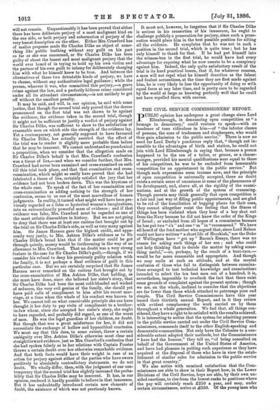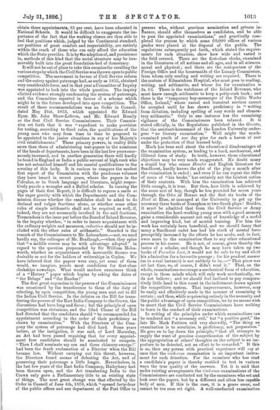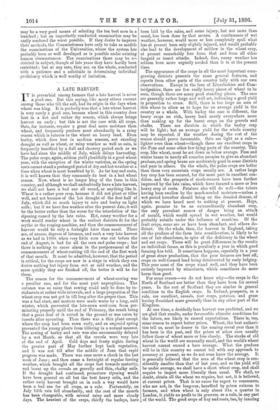THE CIVIL SERVICE COMMISSIONERS' REPORT.
pIIBLIC opinion has undergone a great change since Lord Ellenborough, in denouncing open competition as "a homage to democracy," could venture to speak—with an
insolence of tone ridiculous in him—of "the inferior classes of persons, the sons of tradesmen and shopkeepers, who would thus gain admission to the public service." There is now no need for Lord Derby's ponderous reply that, "though not in- sensible to the advantages of birth and station, he could not join with Lord Ellenborough in saying that, because a person happened to be the son of a tailor, or grocer, or a cheese- monger, provided his mental qualifications were equal to those of his competitors, he was to be excluded from honourable competition for an appointment in the public service." But though such expressions seem truisms now, and the principle of open competition is universally accepted, there no doubt exists a certain sense of uneasiness at some of the phenomena of its development, and, above all, at the rigidity of the exami- nations, and at the growth of the system of cramming. Though parents may think generally that open competition is a fair and just way of filling public appointments, and are glad to be rid of the humiliation of begging places for their sons, they cannot altogether resist the feeling that the fitness of things has been violated when they hear of a boy shut out from the Navy because he did not know the order of the Kings of Israel ; or excluded from all hopes of a commission because he has put two " c's " and one " m " in "recommend." We have all heard of the fond mother who argued that, since Lord Nelson could not have written" a short life of Hezekiah," nor the Duke of Wellington have "got up" Bacon's Essays, there was no reason for asking such things of her son ; and who could not help thinking that to decide the matter by asking some- thing useful,"—or, perhaps, by the result of a boat-race,- would be far more reasonable and appropriate. And though we may smile at such an attitude, and at the mental confusion of those who fail to distinguish between examina- tions arranged to test technical knowledge and examinations intended to select the ten best men out of a hundred, it is, nevertheless, impossible to overlook the fact that there exist some grounds of complaint against the present system ; though we are, on the whole, inclined to consider that the objections are far fewer than those which attached to patronage pure and simple. The Civil Service Commissioners have this year issued their thirtieth annual Report, and in it they review with evident complacency the work carried on by them throughout a whole generation. We feel that, all things con- sidered, they have a right to be satisfied with the results achieved. It is interesting to notice that the system for admitting persons to the public service carried out under the Civil Service Com- missioners, commends itself to the other English-speaking and democratic communities. Not only have the Colonies to a con- siderable extent adopted their methods, but the Commissioners "have had the honour," they tell us, "of being consulted on behalf of the Government of the United States of America, and have had pleasure in putting such experience as they have acquired at the disposal of those who have in view the estab- lishment of similar rules for admission to the public service in that great country."
We also notice with unmixed satisfaction that the Com- missioners are able to show in their Report how, in the Lower Divisions of the Civil Service, boys are able, by their own un- aided exertions, to rise from the lowest ranks to positions where the pay will certainly reach £250 a year, and may, under certain circumstances, arrive at £350. Of the young men who
obtain these appointments, 95 per cent. have been educated in National Schools. It would be difficult to exaggerate the im- portance of the fact that the working classes are thus able to feel that positions which, judged by the Continental standard, are positions of great comfort and respectability, are entirely within the reach of those who can only afford the education which the State provides. It is by the adoption of, and persistence in, methods of this kind that the social structure may be irre- movably built into the great foundation-bed of democracy.
It will not be out of place to take this occasion for recalling the various steps by which the Civil Service was thrown open to public competition. The movement in favour of Civil Service reform and the outcry against patronage had, as early as 1853, obtained very considerable force, and in that year a Committee of Inquiry was appointed to look into the whole question. The inquiry elicited evidence strongly condemning the system of patronage, and the Committee reported in favour of a scheme which might be in the future developed into open competition. The result of these recommendations was an Order in Council, dated May 21st, 1855, which appointed Sir Edward Ryan, Mr. John Shaw-Lefevre, and Mr. Edward Romily as the first Civil Service Commissioners. Their Commis- sion set forth that it was "expedient to make provision for testing, according to fixed rules, the qualifications of the young men who may from time to time be proposed to be appointed to the junior situations in any of her Majesty's civil establishments." These primary powers, in reality little more than those of administering test-papers to the nominees of the heads of departments, have been in the last few years enor- mously increased, and in another generation there will hardly be found in England or India a public servant of high rank who has not submitted himself and his mental qualifications to the scrutiny of this body. It is curious to compare the modest first report of the Commission with the ponderous volumes they have issued in recent years, where the papers in the Calculus, or in Greek language and literature, might respec- tively puzzle a wrangler and a Balliol scholar. In turning the pages of their first Report, it is difficult to repress a smile at the eager gravity with which the Departments and the Com- mission discuss whether the candidates shall be asked to do decimal and vulgar fractions alone, or whether some other rules of simple arithmetic shall not be required as well, if, indeed, they are not necessarily involved in the said fractions. Tremendous is the issue put before the Board of Inland Revenue, in the inquiry whether, "in order to insure acquaintance with the ordinary weights and measures, reduction should not be in- cluded with the other rules of arithmetic." Guarded is the remark of the Commissioners to Mr. Labouchere,—not, we need hardly say, the colleague of Mr. Bradlaugh,—when they opine that "a middle course may be with advantage adopted" in regard to the question propounded by Sir William Moles- worth, whether an acquaintance with mercantile finance was desirable or not for the holders of writerships in Ceylon. We have inferred that the papers were easy, yet some of them would, we imagine, puzzle most candidates for first-class clerkships nowadays. What would modern examinees think of a " History " paper which begins by asking the dates of "the Deluge" and "the Exodus 1"
The first great expansion in the powers of the Commissioners was occasioned by the transference to them of the duty of selecting, by open competition, the young men sent out to fill the Indian Civil Service. In the debates on the Bill for trans- ferring the powers of the East India Company to the Crown, the discussions had been long and fierce ; but the principle of open competition was victorious, and the 32nd Clause of the Bill had directed that the candidates should "be recommended for appointment according to the order of their proficiency as shown by examination." With the Directors of the Com- pany the system of patronage had died hard. Some years before, at the instigation, it was said, of Lord Macaulay, an Act had been passed requiring that for every appoint- ment four candidates should be nominated to compete. "Then I shall nominate my son and three chimney-sweeps I" had been the frank exclamation of a Director when the Bill became law. Without carrying out this threat, however, the Directors found means of defeating the Act, and of preserving their patronage a little longer. Nevertheless, in the last few years of the East India Company, Haileybury had been thrown open, and the Act transferring India to the Crown only gave a Parliamentary title to an existing state of things. The next great change was that effected by the Order in Council of June 4th, 1870, which "opened forty-four of the public offices and one department of the Post Office to persons who, without previous nomination and private in- fluence, should offer themselves as candidates, and be able to pass the appointed examinations," and practically com- pleted the process by which some 60,000 offices of various grades were placed at the disposal of the public. The regulations subsequently put forth, which stated the require- ments for each situation, show how wide and varied is the field covered. There are the first-class clerks, examined in the literatures of all nations and all ages, and in all sciences, moral and physical ; and there are the coal-porters of the Foreign Office and the housemaids of the Lunacy Commission, from whom only reading and writing are required. There is the matron of Kilmainham Hospital, who must pass in reading, writing, and arithmetic, and whose fee for examination is 2s. 6d. There is the watchman of the Inland Revenue, who must know enough arithmetic to keep a petty-cash book ; and there is the "temporary boy-messenger of the Public Works Office, Ireland," whose casual and transient services cannot be accepted until he has shown proficiency in " writing from dictation, including spelling of easy words and elemen- tary arithmetic." Only in one instance has the examining
vigilance of the Commissioners been relaxed. It is stated officially, in the Regulations published in the Gazette, that the assistant-housemaid of the London University under- goes "no literary examination." Well might the much- examined youth of our day pine for such a haven of rest under the protection of that learned body. Much has been said about the educational disadvantages of the examination system, as leading to a hard, mechanical, and illiberal form of study. In truth, however, these educational objections may be very much exaggerated. No doubt many a stupid boy who crams Hamlet and English literature for Sandhurst, hardly knows the plot of the play a month after the examination is ended ; and even if he can repeat the titles of some of "his books," has certainly not the faintest notion of their contents. With him the examination has achieved little enough, it is true. But then, how little is achieved by the same sort of boy, though he has pounded for seven years through the Odes of Horace and the first six books of the Iliad at Eton, or managed at the University to get up the necessary three books of Xenophon or two Greek plays! Besides, it must be admitted that from the Civil Service or Army. examination the hard-working young man with a good memory gains a considerable amount not only of knowledge of a useful and improving kind, but of mental training. For him the work has certainly been beneficial, and we should fancy that many a Sandhurst cadet has had his stock of mental force perceptibly increased by the efforts he has made, and, in fact, owes more to the examination than to any other educational process in his career. He is not, of course, given thereby the tastes of a scholar, and though he may have taken up two books of Paradise Lost, it would not be safe to try and elicit his admiration for a favourite passage ; for his prudent answer (as in a real instance) is not unlikely to be,—" That piece was set last time, so, of course, I didn't read it." That, on the whole, examinations encourage a mechanical form of education, except in those minds which will only work mechanically, we do not believe ; and we should feel inclined to pay compara- tively little heed to this count in the indictment drawn against the competitive system. That improvements, however, may be easily and effectively made in the manner of examining is certain ; and thus, while acquiescing entirely in the necessity and the publie advantage of open competition, we by no means wish to assert that the Civil Service Commissioners have nothing to learn in the conduct of their examinations.
In writing of the principles under which examinations can be rendered not "a necessary evil," but "a positive good," the late Mr. Mark Pattison said very shrewdly, "The thing an examination is to scrutinise, is proficiency, not preparation." He goes on to lay down the principle, " that all attempts to supply the want of genuine comprehension of the subject by the appropriation of others' thoughts on the subject is an im- posture to be detected, not an effort to be rewarded." If this is so, then any person with practical experience will say at once that the vivd-voce examination is an important instru- ment for such detection. For the examiner who has read a candidate's papers is thereby enabled to test in various ways the true quality of the answers. Yet it is said that under existing arrangements the viva'-voce examinations of the Commissioners are conducted not by the examiners who set and look over the papers, but by a different and often less capable body of men. If this is the ease, it is a grave error, and cannot be too soon set right. A well-conducted examination
may be a very good means of selecting the ten best men in a hundred ; but an imperfectly conducted examination may be easily rendered the worst possible. If they desire to improve their methods, the Commissioners have only to take as models the examinations of the Universities, where the system has probably been as well developed as is possible under existing human circumstances. The examinations there may be re- stricted in subject, though of late years they have hardly been restricted ; but at any rate, they are, on the whole, conducted with a patience and a solicitude in determining individual proficiency which is well worthy of imitation.




































 Previous page
Previous page